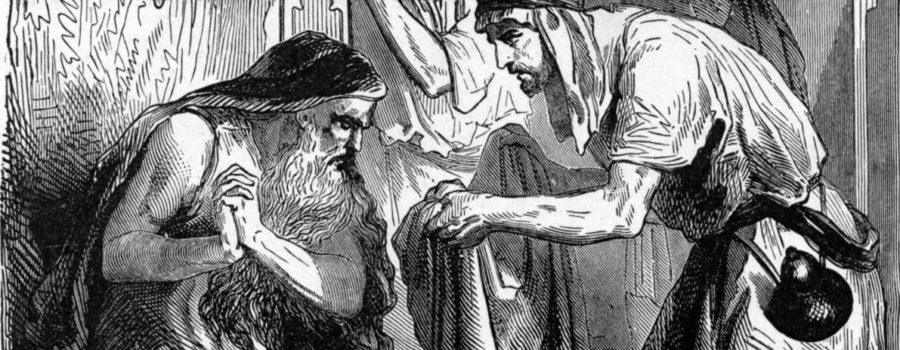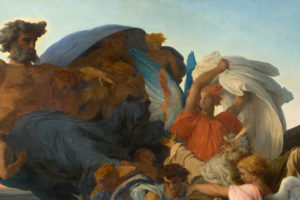In the Book of Genesis we read an account of how Yosef’s brothers sold him into slavery in Egypt. Pay close attention to the fate of Yosef’s coat in the following account:
[23] And it came to pass, when Joseph was come unto his brethren, that they stript Joseph out of his coat, his coat of many colours that was on him;
[24] And they took him, and cast him into a pit: and the pit was empty, there was no water in it.
[25] And they sat down to eat bread: and they lifted up their eyes and looked, and, behold, a company of Ishmeelites came from Gilead with their camels bearing spicery and balm and myrrh, going to carry it down to Egypt.
[26] And Judah said unto his brethren, What profit is it if we slay our brother, and conceal his blood?
[27] Come, and let us sell him to the Ishmeelites, and let not our hand be upon him; for he is our brother and our flesh. And his brethren were content.
[28] Then there passed by Midianites merchantmen; and they drew and lifted up Joseph out of the pit, and sold Joseph to the Ishmeelites for twenty pieces of silver: and they brought Joseph into Egypt.
[29] And Reuben returned unto the pit; and, behold, Joseph was not in the pit; and he rent his clothes.
[30] And he returned unto his brethren, and said, The child is not; and I, whither shall I go?
[31] And they took Joseph’s coat, and killed a kid of the goats, and dipped the coat in the blood;
[32] And they sent the coat of many colours, and they brought it to their father; and said, This have we found: know now whether it be thy son’s coat or no.
[33] And he knew it, and said, It is my son’s coat; an evil beast hath devoured him; Joseph is without doubt rent in pieces.
[34] And Jacob rent his clothes, and put sackcloth upon his loins, and mourned for his son many days.
[35] And all his sons and all his daughters rose up to comfort him; but he refused to be comforted; and he said, For I will go down into the grave unto my son mourning. Thus his father wept for him.
[36] And the Midianites sold him into Egypt unto Potiphar, an officer of Pharaoh’s, and captain of the guard.
(Gen. 37:23-36 KJV)
The Stick of Joseph gives us additional details specifically about Yosef’s coat in the following passage:
And it came to pass that when M’roni had proclaimed these words, behold, the people came running together, with their armors girded about their loins, tearing their garments in token, or as a covenant, that they would not abandon YHWH their Elohim; or in other words, if they should transgress the mitzvot of Elohim, or fall into transgression and be ashamed to take upon them the name of Mashiach, YHWH should tear them even as they had torn their garments. Now this was the covenant which they made, and they cast their garments at the feet of M’roni, saying, We covenant with our Elohim that we shall be destroyed, even as our brothers in the land northward, if we shall fall into transgression; yes, he may cast us at the feet of our enemies even as we have cast our garments at your feet, to be trampled underfoot, if we should fall into transgression. M’roni said unto them, Behold, we are a remnant of the seed of Ya’akov; yes, we are a remnant of the seed of Yosef, whose coat was torn by his brothers into many pieces. Yes, and now behold, let us remember to keep the mitzvot of Elohim, or our garments shall be torn by our brothers and we be cast into prisons, or be sold, or be slain. Yes, let us preserve our liberty as a remnant of Yosef. Yes, let us remember the words of Ya’akov before his death; for behold, he saw that a part of the remnant of the coat of Yosef was preserved and had not decayed. And he said, Even as this remnant of garment of my son’s has been preserved, so shall a remnant of the seed of my son be preserved by the hand of Elohim, and be taken unto himself, while the remainder of the seed of Yosef shall perish even as the remnant of his garment. Now behold, this gives my soul sorrow; nevertheless, my soul has joy in my son because of that part of his seed which shall be taken unto Elohim. Now behold, this was the language of Ya’akov. And now, who knows but what the remnant of the seed of Yosef, which shall perish as his garment, are those who have dissented from us? Yes, and even shall it be us if we do not stand fast in the faith of Mashiach.
(Alma 21:9)
The the Stick of Joseph adds details regarding Yosef’s coat—that it was torn in pieces, and that one portion did not decay. These details are not found in the Genesis account nor anywhere in the Bible, but it are found in ancient Jewish legend and writings.
One such location is a collection of Jewish traditions about the prophets gathered by Tha’labī prior to 1036 CE. The stories were obtained from the descendants of Jewish refugee families in Persia who fled the destruction of Jerusalem by the Romans in 70 CE. The story is as follows:
And when Joseph made himself known to his brethren, he asked them about his father. ‘What happened to our father, Jacob? What happened to my father after I left?’ They said, ‘He lost his eyesight from weeping.’ Then Joseph gave them the garment, the part that clung to him and he still wore. Joseph handed them the garment, ‘And this garment was the garment of the Garden of Eden. It had the weave and the pattern of the janna.’ It had in it the breath of the garden so that it never rotted, never decayed, and its threads never deteriorated. That was its true state.’…and ‘Joseph gave that garment to them, and this was a garment that had belonged to Abraham.’ This is the ‘coat of many colors’ spoken of in Genesis 37:3.
(See Maddock, Robert. The 1300 Year’s War: Volume 2 Xlibris US; see also Tha’labi, Ahmad ibn Muhammad, ‘Ara’is al-majalis fi qisas al-anbiya’, or, Lives of the prophets / as recounted by Abu Ishaq Ahmad ibn Muhammad ibn Ibrahim al-Tha labi; translated and annotated by William M. Brinner).
From the above account we see that tradition from at least a thousand years ago spoke of the garment being torn into pieces, a part remaining without decay in Yosef’s possession. This source, though available in Arabic, was not published in an English translation until 2002.
We also find the tradition of the torn coat in the book of Jasher:
And they [his brothers] hastened and took Joseph’s coat and tore it, and they killed a kid of the goats and dipped the coat in the blood of the kid, and then trampled it in the dust, and they sent the coat to their father Jacob by the hand of Naphtali, and they commanded him to say these words:
(Jasher 43:13)
The Book of Jasher is a “lost book” of the Bible, which is referenced in Joshua 10:13 and 2 Samuel 1:18. The first century Jewish historian Josephus identifies the Book of Jasher as one of “the books laid up in the Temple” (Ant. 5:1:7). Tradition says the book of Jasher was discovered when Rome destroyed Jerusalem in 70 CE, though it was not published until 1625. Some skeptics maintain that this Hebrew Book of Jasher is not the actual Book of Jasher mentioned in the Bible, but is merely a 12th Century Jewish Midrash.
Regardless of whether this Jewish Hebrew book is the authentic Book of Jasher mentioned in the Bible, or merely a 12th Century midrash, this Hebrew book was not published in English until 1840, ten years after publication of the Stick of Joseph in 1830.
Thus, we have encountered two ancient sources, published in 1625 and prior to 1036, both representing much older traditions, and both corroborating the story of the torn coat from the Stick of Joseph. Neither of these works was available to Yosef ben Yosef when he translated the Stick of Joseph in 1830, as neither had yet been translated into English. There is simply no way he could have known about these accounts of Yosef’s coat being torn, yet the torn coat plays a central role at a pivotal moment in the Stick of Joseph narrative. (See Vows by Analogy in the Stick of Joseph on this blog.)
The story of the torn coat constitutes yet another evidence that the Stick of Joseph is an authentic ancient Jewish text.




1 Comment
Leave your reply.